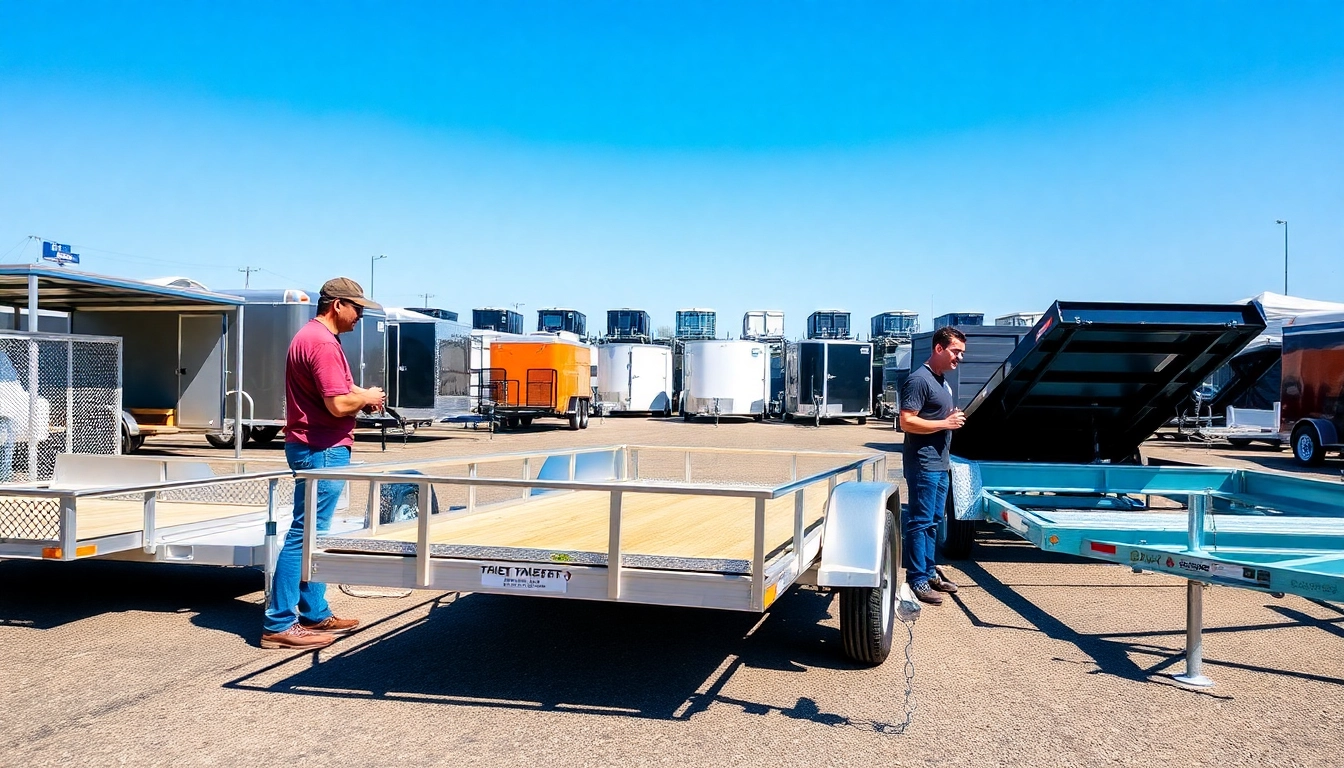1. Understanding Trailers: Types and Uses
1.1 Common Types of Trailers Available for Sale in Massachusetts
When searching for trailers for sale in Massachusetts, it is essential to understand the various types available. Each kind of trailer serves specific purposes that cater to different needs. Here’s a breakdown of the common types of trailers you might encounter:
- Utility Trailers: These versatile trailers are common for personal and business use, designed to carry equipment, vehicles, or supplies.
- Enclosed Trailers: Ideal for transporting sensitive cargo, enclosed trailers protect items from weather elements and provide increased security.
- Cargo Trailers: Specifically designed for transporting goods, cargo trailers come in various sizes and configurations to suit diverse hauling needs.
- Dump Trailers: Used primarily in construction, these trailers have a hydraulic lift to unload heavy materials easily.
- Recreational Trailers: This category includes travel trailers and campers tailored for outdoor enthusiasts looking to explore the great Massachusetts landscapes.
- Car Hauler Trailers: Designed for transporting vehicles, these trailers are built to safely carry cars, trucks, and even boats.
1.2 Choosing the Right Trailer for Your Needs
Selecting the ideal trailer necessitates careful consideration of your planned uses. Here are essential factors to assess:
- Weight Capacity: Know the weight of the load you’ll carry. This will dictate the type of trailer you need, ensuring safety and compliance with road regulations.
- Size: Measure not just the load but also your storage space. Choose a trailer that can be easily parked and stored while accommodating your load.
- Material: Trailers are typically made from steel, aluminum, or fiberglass. Each material has distinct benefits and drawbacks, influencing durability and maintenance requirements.
- Intended Use: Whether you need a trailer for personal leisure or business, pick a model that matches your frequency of use and the nature of your cargo.
By evaluating these criteria, you can make an informed decision that aligns with your hauling requirements.
1.3 Key Features to Look for in Massachusetts Trailers
Beyond choosing the right type of trailer, specific features significantly enhance functionality and safety:
- Braking Systems: Electric brakes are vital for heavier loads, providing better control.
- Suspension Systems: Quality suspension reduces wear and tear and increases stability during transport.
- Wheel and Tire Quality: Durable tires suited for your travel environment ensure optimal performance and reduce the chances of flats.
- Coupler Type: The type of coupler must match your vehicle’s towing capacity and hitch type.
- Lighting and Reflectors: Ensure that your trailer has sufficient lighting for safe night operations, including brake lights and turn signals.
- Load Securements: Look for integrated features for safe cargo securing, preventing movement during transport.
2. Advantages of Purchasing Trailers Locally in Massachusetts
2.1 Supporting Local Businesses While Buying Trailers
Purchasing a trailer locally helps support your community’s economy. Local dealerships and manufacturers provide jobs, often go the extra mile to satisfy their customers, and contribute to the community’s overall prosperity.
Moreover, local businesses are often more knowledgeable about the products they sell and the specific needs of customers in Massachusetts, providing tailored advice and services.
2.2 Benefits of Local Services and Repairs
Buying a trailer locally gives you access to nearby services for maintenance and repairs. Local dealerships frequently offer ongoing service and warranty repairs, allowing for timely solutions and reduced downtime. Many also provide essential parts and accessories, making it easier to maintain your trailer in good working condition.
2.3 Understanding Massachusetts Trailer Laws and Regulations
Every state has its own set of trailer laws and regulations, and Massachusetts is no exception. Understanding these regulations is vital for legal compliance. Key considerations include:
- Towing Capacity: Make sure your tow vehicle meets the weight ratings specified by Massachusetts law.
- Registration Requirements: Trailers must be registered with the Massachusetts Registry of Motor Vehicles (RMV).
- Safety Equipment: Certain safety equipment, like brake lights and reflectors, is required for trailers exceeding specific weight thresholds.
Familiarizing yourself with these regulations, and maintaining compliance, is crucial for safe and legal trailer operation.
3. Where to Find Quality Trailers for Sale in Massachusetts
3.1 Top Trailer Dealerships in Massachusetts
Several reputable trailer dealerships across Massachusetts offer a variety of quality options. Here are a few to consider:
- Tri-State Truck N Trailer: Located in Hatfield, this dealership is known for its extensive selection and customer service.
- The Trailer Depot: This dealer offers new and used trailers, custom accessories, and is recognized for its comprehensive service options.
- All Pro Trailer Superstore: A leading dealership offering a wide range of trailers for various needs.
- Wright Trailers: Known for custom trailer solutions tailored to client specifications.
3.2 Online Marketplaces vs. Physical Locations
In today’s digital age, purchasing trailers online is an option worth considering. However, weighing the benefits and drawbacks of online marketplaces versus local dealerships is essential:
- Online Marketplaces: Sites like Craigslist and RV Trader offer a broader selection and often better pricing. However, they may lack the assurance of quality and do not provide the opportunity for inspection before purchase.
- Physical Locations: Local dealerships usually allow for a hands-on experience, letting you inspect the trailer before buying. They often offer post-purchase services, making them a safer long-term option.
3.3 Tips for Visiting a Trailer Sales Lot
When visiting a trailer sales lot, having a strategic approach enhances your experience:
- Do Your Research: Knowing what trailer types fit your needs makes conversations with salespeople more efficient.
- Inspect Thoroughly: Check the trailer’s structure, brakes, and tires before making a commitment.
- Ask Questions: Don’t hesitate to inquire about the trailer’s history, warranties, and financing options. A reputable dealer will have transparent answers.
- Take a Test Tow: If possible, arrange a test tow to evaluate the trailer’s performance with your vehicle.
4. Financing Options for Buying Trailers in Massachusetts
4.1 Understanding Financing Terms and Rates
Understanding how trailer financing works is crucial when you’re ready to make a purchase. Financing options can include personal loans, dealership financing, or specialized lender loans designed for utility trailers:
Rates can vary significantly depending on your credit score, down payment, and lender type. Always compare offers to find a deal that suits your financial situation.
4.2 Leasing vs. Buying Trailers: Pros and Cons
Deciding whether to lease or buy a trailer depends on multiple factors including budget, usage, and long-term goals. Here’s a closer look at both options:
- Leasing: Pros include lower monthly payments and less maintenance hassle. However, mileage limits and the lack of ownership at the end of the lease can be drawbacks.
- Buying: Purchasing a trailer allows complete ownership and customization; however, you will face higher initial costs and greater responsibility regarding maintenance.
4.3 Finding the Best Financing Providers in Massachusetts
Identify banks and credit unions in Massachusetts that specialize in vehicle loans. Additionally, many trailer dealerships have partnerships with financing companies that can offer competitive rates. Always check customer reviews and ratings to ensure you’re getting the best deal possible.
5. Maintenance and Care for Your Massachusetts Trailer
5.1 Regular Maintenance Tips for Longevity
Proper maintenance is vital for extending the life of your trailer. Here are some essential upkeep tips:
- Regular Inspections: Check structural integrity, including wheels, brakes, and the hitch before every journey.
- Cleaning: Washing your trailer regularly stops dirt and grime accumulation, preserving its exterior and components.
- Lubrication: Ensure bearings, hinges, and couplings are well-lubricated to prevent rust and ensure smooth operations.
5.2 DIY Care vs. Professional Services
While some maintenance tasks can be done independently, others are best left to professionals:
- DIY Tasks: Regular cleanings, tire checks, and minor adjustments can often be performed by owners, saving costs.
- Professional Services: Major repairs or inspections should be handled by qualified mechanics to prevent safety issues that could arise from improper handling.
5.3 Resources for Trailer Owners in Massachusetts
There are numerous resources available for trailer owners that provide guidance on maintenance, safety regulations, and trailer upgrades. Websites of local trailer dealerships often feature helpful articles, while forums and social media groups allow owners to share experiences and tips.















Leave a Reply